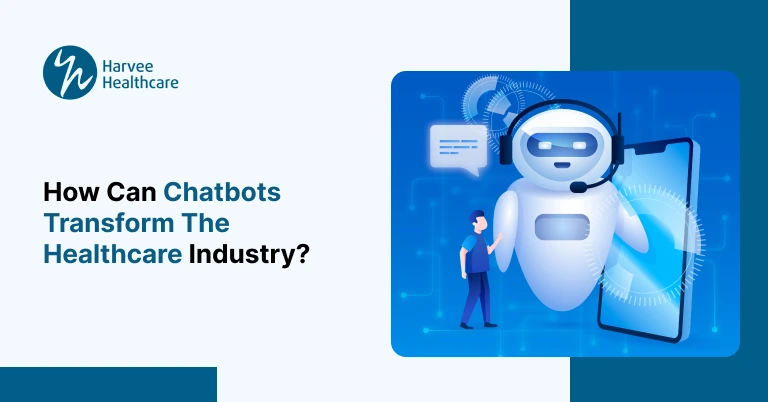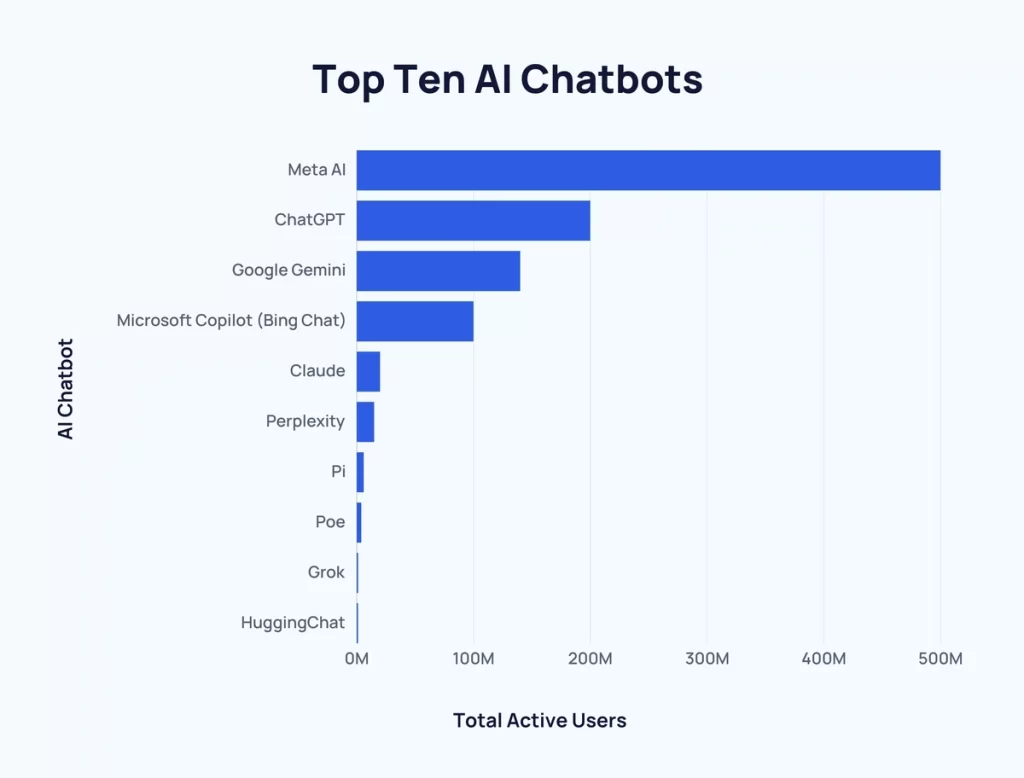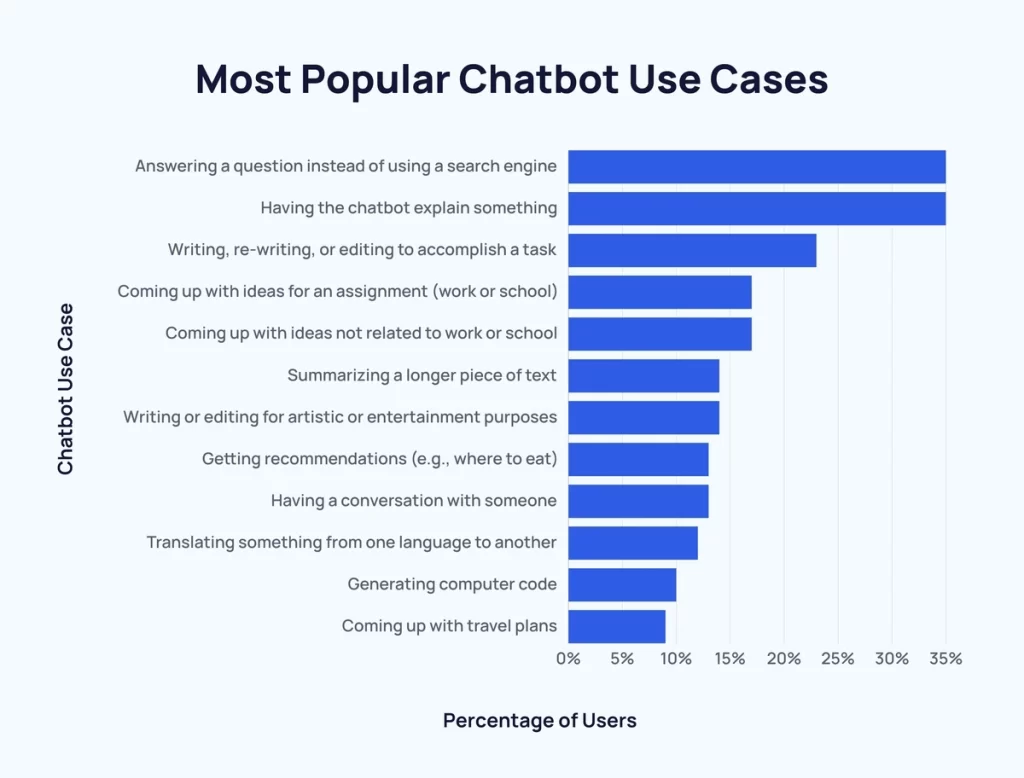
How can Chatbots Transform the Healthcare Industry?
Patients today prefer easy self-service options, and AI chatbots make this possible in healthcare. They help with simple tasks like updating personal details and also guide patients through booking appointments smoothly.
Setting up chatbots is simple in most industries, but healthcare and pharmacy have unique challenges. They deal with sensitive patient information, prescriptions, and medical advice, so accuracy and safety are essential.
This guide explores the role of AI chatbots, their functionality, and how they can benefit your business.
What is a Healthcare Chatbot?
Healthcare chatbots function as smart assistants for doctors and clinics, allowing patients to receive immediate support.
They respond to frequently asked questions, schedule appointments, issue reminders, and carry out regular tasks, making things easier for both patients and medical staff.
Additionally, modern chatbots employ conversational AI to interpret user requests better. If a request is urgent or requires human assistance, the AI promptly recognizes it and connects the user to a real person.

Source: explodingtopics.com
Benefits of Chatbots in the Healthcare Industry
1. Enhanced Patient Engagement
Chatbots keep patients engaged by providing friendly and personalized service. They provide reminders for after-treatment care, discuss health suggestions, and provide lifestyle counsel to help patients maintain their health more effectively.
2. Cost Efficiency
Chatbots reduce staff workload by automating regular operations such as checking insurance details, addressing billing inquiries, and sending follow-up messages. This allows healthcare professionals to save money while focusing more on patient care.
3. 24/7 Availability
Chatbots are always available, allowing patients to receive assistance whenever they need it. Whether consumers want to check doctor availability, arrange an appointment, or receive prescription reminders, chatbots deliver instant responses without the need for office hours or extended phone calls.

Source: explodingtopics.com
4. Improve Resource Efficiency
Chatbots provide fast responses, so patients do not have to wait or be placed on hold. They can handle easy tasks and receive immediate support, allowing your team to focus on more significant issues and enhancing the flow of work.
5. Addressing Staff Shortages
Healthcare providers face staffing shortages, especially in primary and mental health care. Chatbots can help by managing tasks like appointment scheduling and offering support with diagnostics, easing the workload on staff, and ensuring quality care with fewer resources.
6. Integrated with Wearable Devices
Chatbots can connect to wearable gadgets and health sensors to monitor a patient’s health in real-time. This enables immediate care and individualized health suggestions based on data.
7. Data Collection for Insights
Chatbots help gather important patient data, like symptoms and medication habits, offering useful information to improve care, help patients, and support research.
How AI Chatbots Are Transforming the Healthcare Industry?
People are now used to chatting with chatbots for different reasons, including talking to businesses, and healthcare is no different. 74% of customers choose chatbots for quick questions.
Healthcare providers must use modern self-service systems that adhere to rules to meet patients’ growing demands while ensuring security and privacy. Traditional chatbots are insufficient because they are prone to errors and misuse.
However, modern conversational AI chatbots provide more dependable and secure self-service options, allowing patients to access help instantly, complete tasks with AI, or be linked to a team member as needed.
Conversational AI chatbots assist healthcare workers in handling difficult tasks, resulting in a more pleasant and efficient patient experience. They use innovative technology to understand and respond like humans, resulting in a more natural and useful relationship.
Therefore, to fully understand how AI chatbots are affecting the healthcare sector, consider how they assist patients in handling basic tasks on their own. This enables healthcare providers to save time and focus on providing quality treatment more effectively.

Source: Precedence Research
Top 5 Healthcare Chatbot Applications
Appointment Scheduling and Management
With an AI chatbot, patients can quickly message your clinic to book, reschedule, or cancel appointments without waiting on hold. This makes the process simple and more personal, giving them the feeling of talking to a real person.
The AI chatbot integrates with your clinic’s booking system to propose open dates or walk patients through a straightforward booking process. It ensures that the appointment is confirmed before providing any additional information or follow-ups.
Once booked, patients can verify their appointment details or request a reschedule using the chatbot. The chatbot will automatically update their records, the clinic calendar, and the doctor’s schedule.
2. Simplify the Billing Process
In the healthcare industry, billing can be challenging due to payment problems, as well as miscommunication.
An AI chatbot can make things easier by clearly displaying expenses when patients book appointments and guiding them through the payment process. It may also answer questions and ease anxieties along the way, making the process go more smoothly and helping to keep your practice’s finances in order.
3. Helps with Healthcare Insurance Claims
Insurance claims can be difficult for people, especially if they are suffering from medical difficulties. An AI chatbot can assist patients by answering queries about coverage and navigating them through their insurance policies.
It can also guide customers through the claims procedure step by step and give useful reminders to ensure that they submit their claims on time. This simplifies the process and increases patient satisfaction.
4. Assists Follow-Up After Discharge
After leaving the hospital, patients often need follow-up care. Chatbots can help by checking in on their recovery, reminding them of follow-up appointments, and making sure they follow the instructions given at discharge.
5. Reminders for Prescription Refills and Vaccinations
For busy patients, keeping track of prescriptions, medications, and vaccinations can be challenging. An AI chatbot can send tailored reminders to help them stay on schedule.
It also allows patients to ask questions about their dosage, arrange follow-up appointments, or report any side effects they may be experiencing.
Challenges of Healthcare AI Chatbots
While Modern AI chatbot helps reduce mistakes by understanding what users mean, there are still challenges to consider, particularly in healthcare.
AI chatbots can help with simple questions in healthcare, but they are not safe for giving medical advice or answering complex problems. While they sound like real people, it’s too risky to trust AI with anything beyond basic queries.
Healthcare data contains sensitive patient information, and individuals may be hesitant to share their data with an AI chatbot. To ease their fears, make sure your messaging is safe and respects local regulations.
Future Trends of AI Chatbots in Healthcare:
Generative AI chatbots have the potential to transform healthcare by improving care, improving efficiency, and supporting access to services. Here are the main trends and opportunities:
1. Enhanced Personalization:
AI chatbots can provide individualized experiences by integrating health records, lifestyle details, and genetic information.
- Advanced Learning: Chatbots will improve by learning from patient talks.
- Predicting health needs: Chatbots will detect health issues early by recognizing patterns and providing prompt assistance.
2. Integration with Wearable Devices:
AI chatbots can track health in real time and offer individualized advice.
- Instant Health Updates: Provides rapid health suggestions based on wearable data.
- Preventive Care: Identifying health problems early and providing prompt guidance through continuous monitoring.
3. Linking with Electronic Health Records (EHR):
AI chatbots will be better integrated with EHR systems, resulting in faster and easier data management.
- Smoother Data Sharing: Patient data can be easily shared between many healthcare providers.
- Auto Updates: Patient records are updated automatically based on chatbot discussions.
4. Voice-Activated Assistance:
Voice-controlled AI chatbots enable hands-free engagement, making them more user-friendly.
- Accessibility: Making it easy for everyone, especially those with disabilities, to obtain healthcare information.
- Fast Clinical Support: Quickly manage patient data using voice commands.
Bottom Line:
With technological improvements, chatbots are now capable of managing more complex healthcare jobs. They make staffing easier, save expenses, and bring various other advantages. As we look ahead, the potential for chatbots in healthcare expands, making their integration even easier and more effective.
Contact us, Harvee Healthcare, a user-friendly platform that enables you to build personalized chatbots for healthcare that address a variety of patient demands while improving service delivery.
Search
Recent Post
Categories
- AI in Healthcare
- Content Marketing
- Dental
- dental Digital Marketing
- Google Ads
- Google my business
- Healthcare marketing
- Healthcare SEO
- Internet Marketing Tips
- Lead Generation
- Local SEO
- Patient Satisfaction
- pay per click
- Pharma Marketing
- Social
- Social Media Marketing
- Traffic
- Website
- Website Designing
Contact
Get in Touch With Us
Coimbatore Address
- 21/1, Periasubbanna Gounder Street, K.K.Pudur, Coimbatore, Tamil Nadu 641038.
- 098942 76263
- info@harveehealthcare.com

Chennai Address
- RMZ Millenia Business Park, Level 6, Phase II, Campus 4B Unit 602A, Kandancavadi, Perungudi, Chennai, Tamil Nadu 600096.
- 098942 76263
- info@harveehealthcare.com

Dubai Address
- Umm Sequeim 3, Jumeirah Rd Opposite Burj Al Arab, Villa #1 855 A Dubai.
- info@harveehealthcare.com

United Kingdom Address
- 3/2 Powderhall Rigg Edinburgh, United Kingdom EH7 4GA.
- info@harveehealthcare.com

Copyrights © 2025 harvee.co.uk










